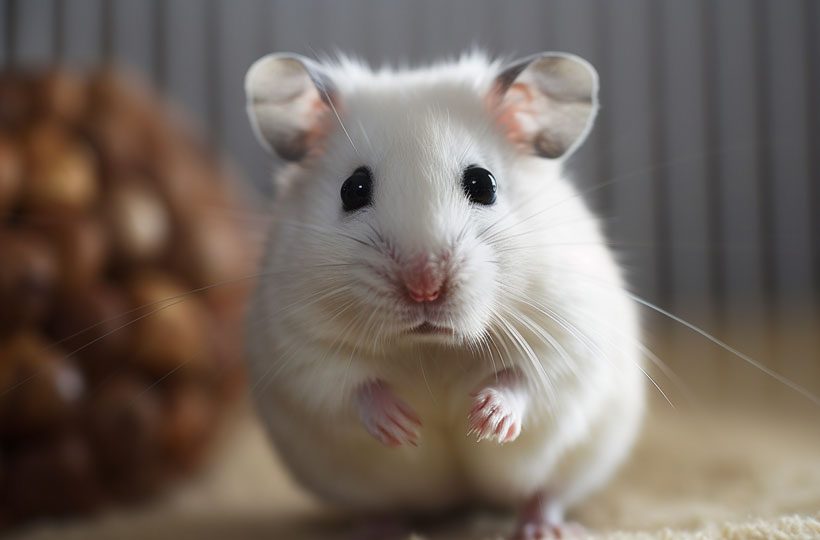How to Get Your Hamster to Like You?
Hamsters are adorable little creatures that can make excellent pets. But building a bond with them takes patience and effort. No matter what, it’s essential to establish a positive relationship with your hamster.
So, how do you get your hamster to like you? This involves gaining their trust, understanding their behavior, and providing care and attention. From creating a comfortable living environment to spending quality time, you’ll discover everything you need to know to build a solid and lasting connection with your hamster.
Now, whether you’re a new hamster owner or have had your pet for a while, read on to discover the secrets to getting your hamster to like you.
4 Tips on How To Make Your Hamster Like You

Here are some tips to make your hamster like you
1. Create a Comfortable Living Space for Your Hamster
Hamsters need a comfortable living space to thrive. A comfortable living space ensures not only your hamster’s physical health but also its mental well-being.
Therefore, creating a comfortable living space that promotes your hamster’s health and happiness is crucial.
Tips for Setting up a Cozy and Safe Environment

- Choose the Right Cage
The cage should be spacious enough for your hamster to move around freely. A cage with multiple levels, tunnels, and hiding places is ideal.
Besides, ensure the bars are spaced appropriately to prevent your hamster from escaping or getting stuck.
- Maintain a Comfortable Temperature in the Hamsters Cage
It is essential for their health and well-being, and it can also help to improve your bond with your pet. Providing a warm, cozy environment will create a space where your hamster feels safe, comfortable, and content, making them more receptive to bonding with you.
- Add Bedding and Nesting Material
Your hamster needs a comfortable place to sleep and nest. Soft bedding such as wood shavings, hay, or paper-based products like Carefresh can create a cozy environment for your hamster.
But avoid using cedar or pine shavings, which can cause respiratory issues.
- Provide a Water Bottle and Food Dish
Your hamster needs access to fresh water and food. Use a water bottle instead of a bowl to avoid spills and contamination. Choose a food dish that is shallow and heavy enough to prevent tipping.
- Keep the Cage Clean
Regularly clean the cage to ensure a hygienic environment for your hamster. Remove any uneaten food or soiled bedding and replace it with fresh ones.
Use a mild detergent and warm water to clean the cage, and rinse thoroughly to avoid any soap residue.

Providing Toys and Activities to Keep Your Hamster Happy and Stimulated
- Add exercise equipment: Hamsters are active animals that need exercise. A wheel, climbing toys, or tunnels can allow your hamster to play and exercise.
- Provide chew toys: Hamsters love to chew and chew toys such as wooden blocks or apple sticks can help keep their teeth healthy.
- Offer foraging opportunities: Hide treats or food around the cage to encourage your hamster to forage and search for food. This can help stimulate their instincts and prevent boredom.
- Spend time playing with your hamster and offering them attention and affection. This can help build a strong bond and keep them happy and content.
2. Create Positive Reinforcement
Positive reinforcement is a technique used to encourage positive behavior by rewarding the desired behavior.
It works by providing a reward or positive consequence immediately after a behavior is exhibited, increasing the likelihood of it being repeated.

Rewards to give your hamster to encourage positive behavior
Here are some examples of good rewards to give your hamster.
- Small pieces of fruits and vegetables: Hamsters love treats such as carrots, cucumbers, apples, and pears.
- Seeds and nuts: You can give your hamster sunflower seeds, pumpkin seeds, and unsalted nuts such as almonds, hazelnuts, and peanuts.
- Small amounts of protein: You can offer your hamster small amounts of cooked chicken, turkey, or scrambled eggs as a special treat.
- Treats designed for hamsters: You can purchase specially-made hamster treats that are nutritionally balanced and safe for your pet.
How to use positive reinforcement to bond with your hamster?
Here are some ways to use positive reinforcement to bond with your hamster.
- Offer Treats From Your Hand
Sit with your hamster and offer small treats from your hand.
- Clicker Training
You can use a clicker to train your hamster to perform tricks and behaviors. When your hamster performs the desired behavior, click the clicker and immediately offer a reward.
3. Establish Trust and Build a Relationship
Establishing trust with your hamster is crucial to ensuring they feel safe and secure in their environment.
Importance of building trust with your hamster
- Building trust with your hamster also helps to prevent stress and anxiety, which can negatively impact their overall health and well-being.
- Trust enables you to easily handle your hamster and promote positive behaviors, such as grooming and play.
- A trusting relationship between you and your hamster can make detecting potential health issues or concerns easier.

How to Establish Trust With Your Hamster?
Here are some of the ways to establish trust with your hamster.
- Give Your Hamster Time to Adjust
When you bring it home, giving them time to adjust to its new surroundings is essential. Let your hamster explore their new home at their own pace.
- Speak Softly and Move Slowly
Avoid sudden movements or loud noises, as these can cause your hamster to become frightened.
- Handle With Care
When you start handling your hamster, do so gently and with care. Support their body with both hands, and avoid squeezing or holding them too tightly.
- Be Consistent
Consistency is vital to building trust with your hamster. Stick to a routine of feeding, cleaning, and handling your hamster; they will quickly learn to trust you.
- Hold Your Hamster for Short Periods

Here are some steps on how to hold your hamster and things to do when holding them
- Start slowly: It is important to take things slow when you are first building trust with your hamster. Start by offering them treats from your hand, allowing them to sniff you, and becoming familiar with your scent.
- Use a small room: Choose a small, quiet room for your first holding session. This will help your hamster feel safe and secure.
- Use a towel: Hold your hamster in a towel to help them feel secure and prevent them from slipping out of your hands.
- Hold gently: Support your hamster gently and firmly with both hands. Make sure you do not squeeze or hold too tightly.
- Talk softly: Speak to your hamster in a soft, gentle voice to help them feel relaxed and safe.
- Keep it short: Hold your hamster for short periods at first, gradually increasing the time as they become more comfortable with you.
- Offer treats: Offer your hamster treats while holding them to help them associate being held with positive experiences.
- Observe their body language: Watch your hamster’s body language while holding them. If they seem uncomfortable or stressed, put them back in their cage and try again another time.
Building a Relationship Through Daily Interaction
- Playtime: Set aside time each day for playtime outside of their cage.
Use toys, tunnels, and other hamster-safe objects to create an enriching environment for your hamster to explore.
- Grooming: Grooming is an integral part of bonding with your hamster. Use a soft-bristled brush to groom your hamster’s fur, and gently trim their nails as needed.
- Talk to your hamster: Hamsters may not understand what you’re saying, but they will recognize your voice and respond to your tone.
- Offer affection: Hamsters may not be as cuddly as other pets, but they still crave affection. Stroke your hamster’s back or head, and offer them treats and toys to show your love and appreciation.
4. Be Patient
Patience is critical in the process of building trust with your hamster. It’s important to understand that your hamster will come to you on their terms, and pushing them too hard can slow the bonding process.
Tips for Being Patient When Interacting with Your Hamster
Follow the tips on “How to Establish Trust With Your Hamster” to learn how to be patient. Apart from those, you can follow this advice as well:
- When approaching your hamster, move slowly and calmly. Sudden movements can startle them and make them feel threatened.
- Offer them their favorite treats by hand with patience to encourage them to approach you.
- Before interacting with them, give your hamster time to explore its cage and get used to its environment.

The Benefits of Being Patient With Your Hamster
Being patient with your hamster can have many benefits, including.
- Building a Stronger Bond
The more patient and understanding you are with your hamster, the stronger your bond will be.
- Reducing Stress
Hamsters are sensitive creatures and can quickly become stressed if they feel threatened or uncomfortable. Being patient and gentle can help reduce their stress levels.
- Improving Their Overall Health
A relaxed and comfortable hamster is healthy. Being patient and understanding can help your hamster feel secure and reduce the risk of health problems caused by stress or anxiety.
If you’re looking to strengthen your bond with your hamster, there are several things you can do. For instance, you might want to check out our guide on how to tame a hamster, which provides in-depth techniques for gaining your pet’s trust and building a positive relationship. Additionally, our guide on how to hold a hamster can help you handle your pet safely and confidently, which can also help strengthen your bond. By following these guides, you’ll be well on your way to creating a happy and healthy relationship with your hamster.FAQs
Here are some frequently asked questions on how to make your hamster like you.
Q: Why Does My Hamster Seem Afraid of Me?
Hamsters are naturally skittish and may be afraid of humans, especially if they haven’t been socialized or handled often.
Q: What Should I Do if My Hamster Bites Me?
If your hamster bites you, don’t take it personally. It’s usually a defense mechanism if they feel threatened or scared. Wash the bite with soap and water and apply a bandage if necessary. Try to determine why your hamster bit you and avoid repeating that behavior in the future.
Q: How Can I Bond With My Hamster?
Bonding with your hamster takes time and patience. Spend time near their cage, talk to them, and offer them treats. Once they seem comfortable with you, try offering them food from your hand and eventually move on to picking them up and holding them.
Conclusion
Getting your hamster to like you requires patience, consistency, and understanding of their behavior. The key is establishing trust by providing your hamster with a safe and comfortable environment, offering treats, and handling them gently and respectfully.
It’s important to remember that hamsters may take some time to warm up to you. You can build a bond of friendship by spending time with your hamster and engaging in interactive play. Your hamster can become a loyal and loving companion with time and effort.




